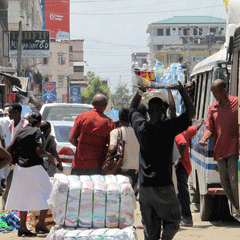|
[7 June 2013] –The African Development Bank (AfDB) has made it clear that cities can play a major role in addressing two of the main challenges for Africa’s growth – diversification and inclusivity.
The urgency is palpable. Over the next 20-25 years, Africa’s urban population will grow by more than 300 million people—roughly equivalent to the entire population of the United States.
This growth requires overwhelming amounts of capital investment. According to estimates, US$20-25 billion per year needs to be invested in basic urban infrastructure, and an additional $20 billion per year in housing—levels of investment that are well beyond the financial capacities of most African governments.
In 2011, the bank adopted an urban development strategy designed to transform African cities and towns into engines of economic growth and social development. It is the first such strategy for the AfDB.
Now, the bank is considering how to best operationalise its urban strategy. In an effort to jump-start the process, the bank identified cities as one of the main themes for discussion at its recent annual meetings—held 27-31 May in Marrakesh, Morocco—to discussion on practical approaches for implementing the strategy.
Two major workshops were dedicated specifically to urban: a high-level seminar on urbanising African cities organised by AfDB, and a second one hosted jointly by AfDB, United Cities and Local Governments Africa (UCLGA), and the UCLG Committee for Local Finance for Development on the role of local governments in financing urbanisation.
Participants included, among others, UN-Habitat chief Joan Clos; UCLGA President and Mayor of Dakar Khalifa Sall; Rabat Mayor Mr. Fathallah Oualalou, who also serves as head of the UCLG’s local finance committee; the Minister of South Africa’s Planning Commission, Trevor Manuel; and Rogerio Joas N’Komo, Finance Advisor to the City of Maputo. The Cities Alliance was represented at the events by Sr. Urban Specialist Serge Allou, who served as a panelist at the UCLGA event.
During the AfDB workshop on African cities and sustainability, AFD Deputy Director for Africa Thierry Paulais presented the findings of his work on financing African cities, which was the culmination of four years of research and analysis financed jointly by the Agence Française de Développement (AFD) and the Cities Alliance.
In the UCLGA session, AfDB gave an in-depth presentation of its urban development strategy, which focuses on three core elements: infrastructure delivery and maintenance, urban governance, and private sector development. All of these elements are fully consistent with the bank’s overarching 10-year plan.
The challenge now is to take concrete steps towards putting the urban strategy in place. According to Désiré Vencatachellum, Director of Policy and Operational Resources for AfDB, these steps include building internal capacity on urban, reflecting on possible financial instruments, and better defining what kind of advisory role the Bank could play to assist clients.
Another key challenge is ensuring that AfDB’s internal structure is able to move beyond a sectoral approach and address urban as a cross-cutting issue.
Both seminars were well attended and featured spirited debates among African mayors, who raised critical issues such as cities’ inability to access direct lending, and how AfDB could help build capacity in cities and design financing schemes more in line with the reality.
For their part, UCLGA broached the suggestion that AfDB should create an advisory committee of local governments.
In addition to our presence at the AfDB annual meetings, the Cities Alliance has been in ongoing discussions with the AfDB regarding its urban development strategy. The dialogue has focused on two main areas: building internal capacity with the AfDB on urban matters, and helping the bank to identify shared priorities for capital investment. Of particular relevance is the Cities Alliance’s participatory approach, which focuses on dialogue and consultation among all stakeholders to determine development priorities.
The AfDB also attended a March 2013 meeting in Addis devoted to developing a new Africa strategy for the Cities Alliance partnership.
With the emerging synergies among both organisations, AfDB is in talks to potentially join the Cities Alliance. As a member of the partnership, the AfDB would be part of a discussion with all major global actors working on urban, a rich platform for dialogue that could help them identify ways to move forward with implementing their strategy.
|
|
|
|
| 40 percent of Africa’s population that now lives in cities produces 80 percent of its GDP. (UN-Habitat State of African Cities 2010) Photo: SDI |
| |
| |
|
“AfDB is progressively recognising the role of cities in development, which is very promising. The Cities Alliance can be a real springboard for AfDB to overcome some of its institutional obstacles and turn its strategy into reality.”
--Serge Allou, Cities Alliance Sr. Urban Specialist
|
| |
| |
|
Related Items
AfDB Annual Meetings website
AfDB’s Urban Development Strategy
Financing Africa’s Cities by Thierry Paulais
|
|
|
|





